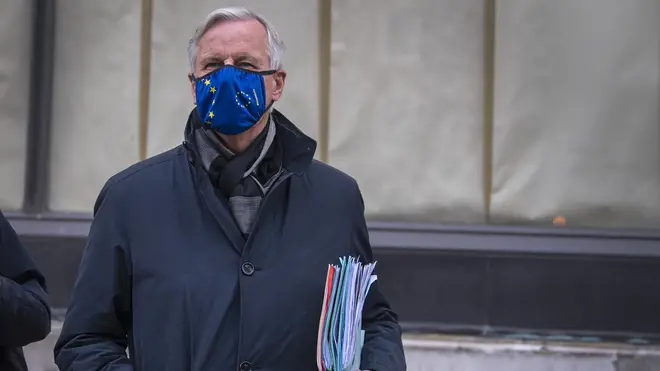
Oli Dugmore 4am - 7am
4 November 2020, 17:50 | Updated: 4 November 2020, 18:03

The European Union's chief negotiator Michel Barnier said "very serious divergences" still remained in Brexit trade talks with the UK.
Mr Barnier is engaged in face-to-face talks with his UK counterpart Lord Frost in the Belgian capital in a bid to bridge the gap on outstanding areas as they look to strike a deal before the transition period ends on December 31.
The EU's chief negotiator said the main stumbling blocks remained the "level playing field" aimed at preventing unfair competition on areas including state subsidies, fisheries policy and the governance of any deal.
Read more: Business groups say cost of everyday items 'could soar' under no-deal Brexit
He said: "Despite EU efforts to find solutions, very serious divergences remain in level playing field, governance and fisheries.
"These are essential conditions for any economic partnership."
Lord Frost said progress had been made but "wide divergences remain on some core issues".

German MEP's scathing attack on Boris Johnson over Brexit
"We continue to work to find solutions that fully respect UK sovereignty," he said.
The update comes after EU and UK talks got back on track following Prime Minister Boris Johnson's decision to pause the negotiations last month after European leaders called for Britain to make concessions.
Mr Barnier later agreed that both sides would need to budge to move closer to a deal, a development that led to discussions recommencing.
Fisheries, state aid and the governance of any deal have continued to be obstacles in the path to an agreement, with time running out to prevent a no-deal fallout at the end of the year.
There were reports this week that there had been a breakthrough on fishing rights, although neither side would confirm it.
The Sun reported that the EU had agreed to adopt new scientific criteria that could see UK fishing quotas double, although the change would not come in for a number of years.
But Downing Street said on Tuesday there remained "significant gaps" on the "most difficult areas" in the talks.
Number 10 is pushing for future fishing negotiations to work on the principle of zonal attachment, a prospect the EU has repeatedly ruled out, including again this week.
Zonal attachment works on the premise that the country or jurisdiction where fish shoals spend most of their time - a calculation based on geographic catching records - should have control over access and quota levels, which would benefit the UK given its rich waters.